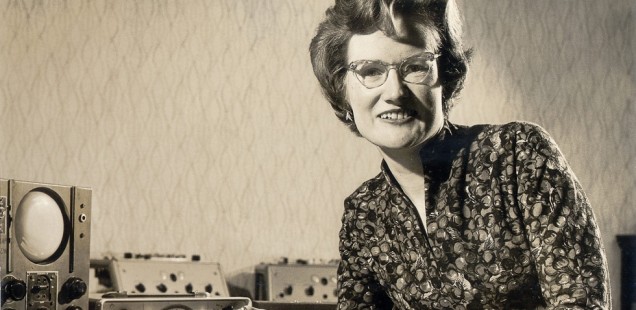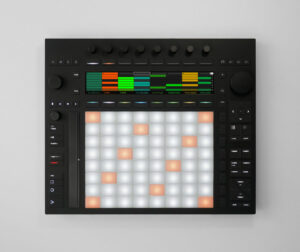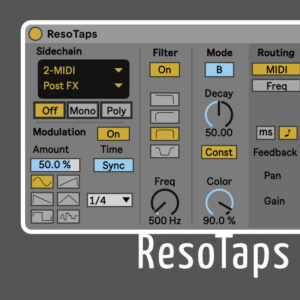Today is International Women’s Day and so this post will be about women making electronic music. Kind of…
Let me begin with a little story. When I started working at Ableton as a tech support I noticed two things.
- There was only the rare email or call from a woman asking for technical help.
- I turned out to be the first woman giving tech support there (Laura Escude was a product specialist which requires as much knowledge, but is a different job).
Later I learnt only 7% of the Ableton Live users were female. That was in 2010 or 2011. I didn’t expect a high percentage, but 7% sorta shocked me. That really got me thinking. Computers have become common household objects, musical gear and software has become much cheaper and easier to operate. So why is it still such a low number of girls and women making electronic music?
So no, I won’t write about a trend of more women getting into music. I don’t want to focus on the female greats of electronic music or talk about how there are so few women in electronic music in this post. Instead I’d like to propose why the percentage might be so low. It’s not based on any statistics or in depth research, but rather personal experiences and endless conversations about the subject with both men and women. In short, my theory is utterly subjective.

Missing allure
For me, music has always been an integral part of my life. Making music or not making music was never the question. Most guys, however, seem to get started with music when they’re teenagers. When I meet a guy who plays guitar, I always ask when he started. ‘As a teenager?’ ‘Yes.’ ‘To appear cool and impress the girls?’ Generally, I get a yes as well, if somewhat more reluctant. No woman I talked to got started with music for these reasons though. Why? Because a girl is rather seen as kooky and boys don’t find girls making music more rad. There’s simply no incentive there. There are also less role models to aspire to. Girls rarely get into music to reach a certain social status.
The percentages are still pretty even when it comes to learning an instrument, but they start diverging dramatically when it comes to music production and the use of technology. There’s an interesting theses called ‘De-gendering the electronic soundscape: women, power and technology in contemporary music‘ from 1996 that is still worth the read. In it Brown concludes:
[…] most women tackle their learning of technology in isolation or by ranging the fringes of male activity, rather than by forming solidarity groups and setting up cooperative learning situations with peers.
Gender clichés as obstacles
There are a lot of clichés out there that contribute to this. From the one, that women have a poor taste in music to the one that a woman in music surely must be the singer to the women and technology myth.
When I started doing phone support shifts I was shocked how often I was either mistaken for a secretary or how some insisted to speak to someone else when they heard a woman’s voice on the other end. Mostly in the American shift, occasionally in the European one and never by a woman. Some guys though were thrilled to talk to a female support, I’d like to add. Yes, I had heard all the ‘We don’t play with girls because they can’t carry their own amps.’ or ‘You sing on this track’? or ‘Who produced your songs?’ etc. pp. But I didn’t expect to be confronted with the same prejudice after being hired for this specific job (Ableton’s hiring process involves tests and quite a few interviews). When I asked my direct boss how I could react on the phone, he ignored my concerns with ‘I can’t imagine that.’ Turning a deaf ear doesn’t make an issue disappear, just saying.
Encountering the same prejudices over and over is not unlike a self-fulfilling prophecy. Girls often have to work harder to be taken seriously especially in music production and thus, only the ones truly interested will continue. There’s an interesting article in Attack Magazine about women in electronic music, and even though it means well, it also voices the same cliché:
For women to impact upon the male saturated space of electronic dance music is tough, not just with the mastering of the technical side or the creating and playing of tracks, but with the individual’s reception.
It’s not about getting treated differently, women already are. Rehashing clichés doesn’t help. As long as technology is attributed with masculintiy and stereotypical gender roles are supported, not much will change. Let’s just assume that anyone could be good in any field he or she chooses and encourage this. Ultimately, it’s about human beings fulfilling their dreams and going after their passions, isn’t it? And while we’re at it, let’s stop with the ‘murses’ jokes, too.
I’d like to end this post with Dani Siciliano’s fitting ‘Be My Producer’:
What are your thoughts on the subject? Do you agree? Think I’m totally off with my theory?


















31 Responses
Being a part of the electronic music scene, as a VJ and a music producer, I now have my own music label, and write since almost 10 years (in French) about my life as a “cyber girl”. I still don’t understand what would be different in using machines and technology for a woman. But I try to act in several ways to change the balance. Mainly, it’s writing and show my work, pointing on the fact that I’m a female : I have a female name, I don’t hide my feminine aspect when I play (not that I mix boobs out, but I don’t wear a mask neither), I put female images in my visuals and female voices in my audio mixes, and part of my blog is named ‘geeky girl in motion”. And don’t be mistaken, contrary to what a lot of dudes say : NO, I don’t have more audience just because I’m a girl. People come to me for my art, my technical skills, my ideas, that’s all, and very good.
Another big point in my activities is to give computering and multimedia art lessons prior to girls. Also, I’m part of female:pressure, and try to include girls in my label (which is not so easy as they don’t respond a lot to propositions of collabs).
The only thing I may point out right now is what I have learned after 10 years of being a professional in my field (I mean, I have money from my work, I live with it, I work for big companies) : making art and selling art are two different things. And actually, the “selling art” part of the job is very competitive, very aggressive, and totally a “men’s world”. It’s not about just being nice, smiling and doing a good job. It’s about making a lot of collaboration, promote other’s people work too, and be in the right place at the right moment. Which is not something girls are keen on.
So far, I will keep on my works and cheer girl’s works too.
Your article is really nice, thank you for sharing!
Love and light,
Mina
vjmina.com
Hi Madeleine, I have been using Ableton since 4, I’m currently on 8. I totally recognize myself in the 2 points your are mentioning in the missing allure paragraph as I only began producing digital compositions in my late twenties and I have been pretty much tackling my learning of technology in isolation in my bedroom , bedroom sonic music or as the author Jennifer Brown says “by ranging the fringes of male activity, rather than by forming solidarity groups and setting up cooperative learning situations with peers” ( I must read that book) Best wishes O
I only skimmed through the theses, but I definitely will read it as well. I started making music actively in a band context. At first in an all girl band (the boys refused to let me join). I got into digital music production through the (male) drummer of my second band. I was lucky enough to be able to study Electroacoustic music as part of my degree in media design which gave me a good foundation. After that I mostly continued on my own after trying in vain to find likeminded musicians. So ultimately most of the learning happened on my own as well. It’s great to hear from other women through this article. It made me think I should feature interesting female (and also male) electronic artists on Sonic Bloom as well.
this is a nice read and i can fully sign it. intersting point is why most boys start music as a teenager, yeah its still not so cool to do music when you are a teenage girl i guess. thanks for sharing your experiences. gg
Thanks Madeleine An interesting article too here “Why women must be at the forefront of the technological revolution” http://www.guardian.co.uk/technology/blog/2013/mar/07/technological-revolution?INTCMP=SRCH
Well, I am male and I did not start making music as a teenager but in my early childhood by learning the recorder, singing in a children’s choir and then progressing to classical guitar, when I was 10. I think many people (no matter whether they are female or male) start their musical education in this traditional way, especially most of those who are outside the “electronic music” scene.
As a music teacher I have observed that girls and boys differ very little in their interest concerning music, till they are about 13 or 14 years old. After that something changes: many teenagers start to follow stereotypes: if you’re a boy, you don’t sing at this age (many boys can’t sing at this age because the voice brakes), so you pick up the electric guitar or drums or (more unusually) a synthesizer. These instruments are loud and aggressive and let young people express their feelings. And no, it is not about impressing the girls, though many men will say so, if you, a woman, aks them: “Did you do it to impress the girls?” Few men will admit that they weren’t really that interested in girls yet, at the time they started playing electrical guitar.
If you’re a girl and in a band at that age, you’re likely to be the singer. And many girls seek this role. I am coaching several bands with teenagers and I get ten times more requests by girls who want to sing, to join one of these bands, than by kids of both sexes who want to play drums, guitar or keyboards. I react by asking everybody who wants to become a singer (in 9 out of 10 times it is a girl) to learn an instrument first. And I also offer guitar lessons or send them to guitar, drum or piano teachers.
So it is possible to encourage girls to pick up instruments (or electronic music equipment), but they need more encouragement for that than boys, while boys need more encouragement to try to sing.
Another thing that I have encountered many times, that once the girls get interested in parties, dancing and boyfriends, many begin to neglect their musical “career”. I boy would not do that. No boy leaves his band to have more time to spend with his girlfriend – girls at this age often become totally dependent on their boyfriends and start to neglect their own interests.
So basically, what you are saying is that they follow the old gender roles once they become teenagers. This totally makes sense as they’re trying to find themselves, often feel insecure and vulnerable. Judgement between peers appears to be harsher then as well.
Btw, I don’t recognise myself at all in your description. I started playing guitar at the age of 6. When I started my first band (all female) I only ended up singing because the other girls didn’t want to and I was writing most of the songs anyway. Most of the women I know first learnt to play an instrument and then perhaps later got into singing as well (not all do sing). Maybe things have changed due to all those casting shows, I don’t know. I also feel you’re last paragraph rehashes clichés and even if it was the norm, then this only shows how deeply engrained the gender roles already have become once we are teenagers.
Yes, it might well be that my last paragraph repeats cliches. But it is my experience that teenagers’ lifes often are exactly like these cliches. And there are always those, girls and boys alike, who do not follow these “rules” …
So, I do not agree with your sociological approach to the question: people are individuals. Maybe they do certain things not because they follow or oppose gender roles, but simply because they enjoy doing them.
Do you recommend the ones who want to learn an instrument should also sing? Because if not, it sounds like you find singing of less importance. Plenty of songwriters write with their voice as we always carry it with us.
Yes, I absolutely encourage everybody to sing. Singing is our first and foremost way of expressing ourselves musically.
Following on somewhat from the discussion with Markus, I think that your article (which I very much enjoyed, Madeleine) perhaps undersells the “play music to meet girls” theory. That’s obviously an over-simplification – let’s say “play music with a goal of improving social standing” (whether with girls, other guys, or just some idealised vision of society). I’d be surprised if the number of guys who started playing electric guitar with none of that motivation even broke double digits…
So as a white male who would love to see more female representation in music, particularly production (and who has worked with some very talented female producers), I think there are some tough-to-resolve issues stemming from the above. The main one: if we assume that men get into this side of music (which I’d tend to differentiate from the kind of music that involves lessons, orchestras etc. – something like self-motivated vs school/parents motivated – but that’s certainly not an easy distinction to maintain) for in the hopes of social capital, and that social capital equation doesn’t exist for women, how do you counter that? Because that drive to acquire social capital happens to be one of the major motivating forces in a teenager’s life – that it’s been tied to making music for men is (IMHO) the single most influential factor in the the popularity of that activity in modern society.
Because following on from that, replicating this equation is the only way we could hope to achieve any significant increase in the percentage of women producers. I don’t have a strong impression that there is a significant pool of women waiting in the wings to take their places in the producers’ limelight, precisely because getting to that point often involves taking an early interest and fostering that interest.
Hence the tough-to-resolve issues – it’s not about making music attractive per se. It’s about making it an activity that bestows cultural capital on young women in the same way it does on men (supposedly). That’s a much more significant social shift than just convincing journalists and bookers to get over their residual sexism…
Yes, I agree with you. Good point that I might have oversimplified why boys get into music. I also know guys who only got into it for their love of music and nothing else.
I think a starting point would be for the immediate social environment (family, teachers) to be openminded. To not encourage the old gender roles, but to let both boys and girls do whatever they love. A more openminded approach in general would be great. Getting confronted with the cliché of girl equals singer and the likes on a regular basis can be frustrating and honestly, unnecessary. If anyone stopped and thought before they spoke, things would be easier already.
While there may not be that many women waiting to be producers they do exist. However, they rarely appear in the music tech magazines though and if so, hardly ever posing in front of gear like the men (this is actually addressed in the theses I linked). So this is another thing that needs to change. If you market gear to the male gender only, you can’t be surprised that few women take interest. I’m fully aware that this is a multi-dimensional issue that is very hard to tackle.
Good point (and as you say, made well by plenty of others too) about the role of the media. And I certainly didn’t mean to imply there aren’t plenty of great female producers already working, and perhaps struggling with institutionalised resistance. I guess the point I was trying inexpertly to get at is that I’m not even sure that early interest often stems from music itself, but from the other perceived benefits (obviously with plenty of individual cases to the contrary… in fact I could be totally wrong – at this point I’m working from gut feeling!). But agreed that if the goal is to establish that kind of relationship between women and music, the media is a sound place to start!
Hi madeleine, thanks for the great article! I am wondering where you got that 7 percent number from, are there any live user statistics available publicly? Or is this insider knowledge from your job? Thanks, B
It’s insider knowledge. I could find numbers about Live Users etc, but no percentages (gender, age etc.) anywhere online. It seems to be the same with other DAWs.
I am not a music producer, but I am a woman working in technology, and that quote-
“[…] most women tackle their learning of technology in isolation or by ranging the fringes of male activity, rather than by forming solidarity groups and setting up cooperative learning situations with peers.”
– is utterly true to my experience. Being openly mocked and rejected by the male tech-hobbyist groups I hovered around as a teenager, I retreated to learning on my own. As a young woman working in tech support, I was constantly assumed to be the secretary. As a not-so-young woman working in web development, my gender-neutral-ish first name is STILL always taken to mean that I am male, and when I answer the phone, people will refuse to believe they are actually speaking to the person who has been working on their server/app/website/whatever. This happens nearly every day, and I persist in my career because I find solving problems and making things move on screens to be delightful ways to earn a living.
I am chiming in to suggest that electronic music sounds like it blocks women’s participation in very similar ways to other forms of tech. Peer-interest groups tend to be male-dominated and openly hostile to women’s participation, and the competitive display of existing knowledge is used to gatekeep the club and keep it exclusive, making it harder for older, curious people to join- so that a woman aged 22, having been otherwise occupied in her teen years but now feeling a curiosity about electronic music production, may have a very hard time finding a safe, well-resourced and encouraging place to learn it. A man learning to produce music will hear “you are learning, you will get better”. A woman learning to produce music will hear “women aren’t very good at this. You should try something else.”
This can be solved for electronic music as it has (occasionally, in some corners of the industry) been solved for tech: by talking loudly and often about the women who DO produce electronic music. By combatting the cultural requirement to “turn up already knowing everything”- create environments where it is safe to be curious and learning, especially for women. Run Ableton/electronic music Open Schools & hackathons targeted specifically at women, and find women to teach them. Remove the “if I fuck this up, this audience of mostly-men will assume that all women are inherently bad at this” stress from community events, and I expect you will find more women enjoying it and sticking around. Run a mentor program, encouraging women with skills to share theirs informally with small groups of women who want to learn. Remember that women are more likely to have much, much higher domestic duty loads than men, and therefor much, much less free hobby time: do everything in your power to remove the toxic “only people who have all the free time in the world to dedicate to this get to be successful or acclaimed” side of the culture.
The woman-hostile nature of these communities is not set in stone. These tools are available to us all, and simply because a boys club has formed around their use doesn’t mean that they are in some way owned by that club.
Thank you for sharing your experiences. I’m sure it’s very similar in all tech-related professions. I’ve had the same issues when working as a video editor which (at least in Germany) is not even that male-dominated (1/3 are women), but it has to do with technology.
My article was something I meant to write for a while now as it just felt like it needed to be said somehow. I’ve decided I want to feature artists/producers on this website as well. I won’t shunt men, but I want to focus more on interesting women in this field to give them a much needed platform. I also want to offer Ableton Live classes for girls/women later on. Because of this article I was actually approached by people planning to host learning and showcasing events for women. I’m excited about the prospect of making this happen. 🙂
Seeing as I have been making electronic music for almost 20 years, have traveled the world (mostly on my own) with my skills and also ran an all female label for 5 years (The Homewrecker Foundation 1998-2001) – I am sure I have more than enough insight. I am still surprised things didn´t really change too much since I started, seeing as there are plenty of female VJs, performance artists and singers who utilize electronics on stage.
a list might work….
1. Society as a whole has never really pushed women to get involved with technology.
2. It takes TIME (a lot of it) to learn software, and get to a point to even really lay out an actual song if you are not predisposed or very enthusiastic. I cannot count the amount of men I know who still can´t get a full lp together or even a track, and prefer to noodle around all day instead….
3. No matter how the budget curve has gone down, you still need to invest in your gear to some degree – and are lucky to find a cool partner or friends to help you get started.
4. Many women once at the point to have something presentable do not the self esteem to present it (refer to point 1).
5. The music industry is Hell, everyone has heard that a million times.
6. If the women in question can´t be as tough with promoters, booking agents (if you use one) and venues… you can be put in situations where you get paid less than the men, treated badly by the sound tech, and taken advantage of.
7. Alot of women who have the capacity and time to spend on their music do not have what it takes to represent it… This is no surprise seeing as it is difficult to hibernate most of your life in a studio and then be able to get out there and present your work to the listeners.
8. Once out there you can expect to recieve an insane amount of comments dealing with your appearance, image, etc… This can take the excitement away from a woman who would prefer the more intellectual side of sound programming and this is the point I have seen quite a few ladies just draw back from the whole thing after some time….
ah yeah… sure there is a lot more. I do not make it an issue for me any longer, maybe I lost my idealistic trai of thinking I could change something or help “girls” … In the end, they have to help themselves, no one is “really” going to hold you back, maybe just make it a bit harder – and maybe you will get lucky enough to meet the right people. Keep it up and do not give a fuck about what people say, but this goes for any artist that is serious about their work…
Over and out…
Rachael Kozak (Hecate)
This is a question of time. I hope . Humans are still young. Cliché is real part of education deeply anchored .
This isn’t just about why not more female make electronic music ? It’s also why female are still ( in many cases) pay less than male ? Why they’re afraid to loose their job when they want a child ? And so one …
This is a truly a big issue that goes much deeper than what I wrote about. Yes, women often are paid less for equal work and it can seem like having children is the choice of family over career. All these things have to change. I feel like a new conservatism is happening though and worry that it might be getting worse again. Movements and counter-movements. I hope I’m wrong. 🙂
Hey there, first of all, thanks for voicing concerns about possible new conservative backlashes, and writing up thoughts and experiences, this goes to all of you. Thanks for getting the ball rolling once more, and opening up space for discussions and possible ideas about what is going on, what can be done, and what is most annoying and remarkable about being a woman in electronic music.
It´s also great one´s able to chip in two one´s cents of own experiences and observations. I am an electronic music journalist, DJ and event organiser from Berlin who´s moved out to Buenos Aires eight years ago to “make it here”, as opposed to “making it” in Berlin, whatever this means. Always self-motivated and very captivated by electronic music, I have had a great time moving myself in my scene as a writer and observer. Working as an editor for one of Germany´s most prominent and long-standing music magazines, Raveline for over five years and then as a freelancer for eight more years, the only real discrimination came from other female editors who did not have problems to show almost bare-breasted Love Paraders on the cover whilst objecting themselves to half-naked men! So much about equality! Most women are so used to a male orientated mainstream view that even their own sexuality is twisted into the role of an onlooker and oogler of the female body. And this list of auto manipulation goes on… Most girls will have no problem at all (well, unless you dig under the surface) to wait next to the DJ booth all night long while their “better half” is banging out tunes. Admiring him…
Can you imagine a guy doing this? Waiting all night long like a good doggy? Well, hell, in my experience, they come out twice, get jealous cos there are lots of people responding positively to the music-performance, start to get into a fight about petty stuff, mope about, and then, at best, never ever come out to gigs again… and to make it even worse, they also start to undermine the DJ girl´s career by making negative comments about it.
This takes me to the next point… Cos this is a totally common occurrance – it´s happened to me with almost every single boy friend I had, it´s happened to my female colleagues (I have been organising an almost exclusively female event called Trash Republique since 2009), and it´s not been mentioned here at all: the role of men trying to manipulate women into not being successful in what they do (this gets worse if the male is also making music-art and not being as successful as his ego would like to have it). I have had soooo many comments from men´s side that it´s become insanely obvious!!! We even had a club owner (and yes, Hecate is 100% right, the sound technicians also try to boycott or sabotage performances) saying openly he cannot stand the sight of women taking over his cabin! It´s making him even more nervous if these women are also beautiful.
So whilst always looking at women and trying to blame them for their own failure, I find it majorly important to look at the role of men in the equasion. The recent backleash of neo conservatism is a clear sign for me that things have gone back to how “they should be”, in the eyes of those who like to deal the cards. Women can make it to the top if they are sexy (and using their sex to exercise power) and adhere to those standards males are used to, like the ¨Sibirian tempress” as Greg Wilson puts it in his feature on Nina Kraviz.
There are always alternative paths though, and I will close my rant here musing about those cos this is how I ideally like to deal with issues of discrimination: create an alternative network with people who do not respond to the harshness of this crazy planet but manage to live and work and play together in harmony and filled with glee about connection and interchange. Buenos Aires is a huge city with a potent underground which is always fluctuating between oppression and freedom, and our goal is to carve our niche doing what we love (dj, play, connect, dance, prosper, grow as individuals and collective) and be a good example of those to come, open up new spaces for younger ones, and let them grow and explore too.
First of all, it’s great to hear that you built your own network and put on events.
I agree with almost everything. However, there are guys who are supportive of their musician girlfriend. They may be the minority, but they exist. My boyfriend luckily is one of them. He used to be more successful than me, but not since we met. He’s my go-to-guy for feedback on new productions.
Thanks for the great read- and I do intend to read the thesis. I’m doing my own research on techno music and masculine space.
I also responded to the Nina Kraviz story: http://melissafong.wordpress.com/2013/04/10/nina-kraviz-feminism-in-a-bubble-bath/
I want to keep in touch about this topic. I’m curious about the masculinization of techno etc.
Hi Everyone!
I write a blog about womens street culture and in particular women in electronic music. Check it out here!
http://tlgmagazine.com/andrea-parker-interview/
That’s great. I had a look and it seems you only write about the big names?!
Want to learn how to make electronic/Jazz music BUT whoever I contact… doesn’t really get back to me. Where can I go? I the only girl in a trade of engineers and know all about the boys club, some are excited to see a girl take an interest in what they are doing, but you are excluded unless you are exceptionally good… maybe I’m venting but how do I start?
Just don’t give up. A good start might be joining the international network for women in electronic music called female:pressure. There’s a mailing list and in various cities there are meeting and events happening. I’m part of it and it’s been very helpful. There are other networks like this as well. And you’re right. Us women have to be extremely good to get noticed, but plenty of us are. Shoot me an email if you like. 🙂
You finished with a tune by a male producer FFS!!!
No, you attributed a woman’s work to a male producer. Quote from the K7 website: “‘Be My Producer’ (a 100all-Siciliano outing with beats sampled from that distinctive voice)”.
http://www.k7.com/list/ (click on Dani Siciliano, then Slappers)
What does this as to do with “Gender clichés as obstacles”. I started to be interested about synth and making electro music because a female friend having a groovebox and I thought it was so much fun. After that I learned everything on my own and my gender had nothing to do with the fact that I can can explore or not this topic. Most of the info I got was on internet, by reading or watching video. None of the content of those media where gender specific, everything was focus only on the gears and how to create music.
I think it’s more a matter of interest… After why female are less interest in this topic? Maybe it’s a question of education and influences…
Sounds you like you didn’t even bother reading past the headlines and instead decide it’s down to interests being different. Showcasing very well how males (I’m going to mirror the term you used) and unfortunately also women perpetuate sexist stereotypes that keep women out of the field. Men who know nothing about Ableton Live regularly telling me how they know best certainly has nothing to do with a lot of women being fed up and doing something else where it’s not just constantly a fight upstream.